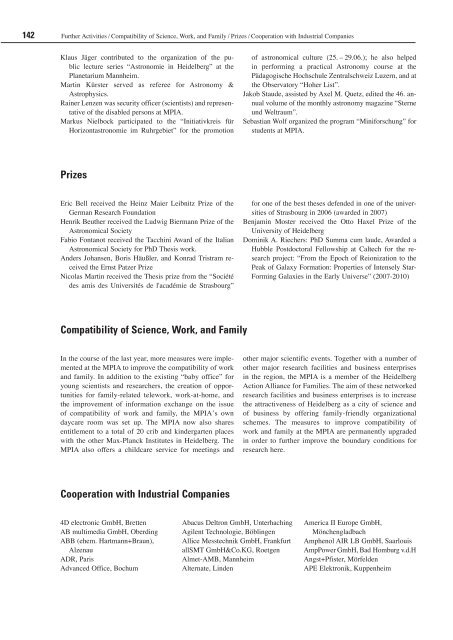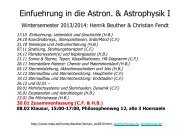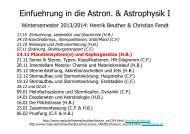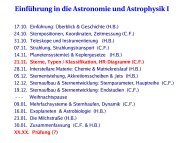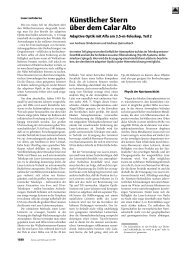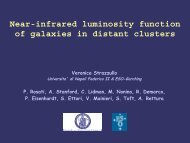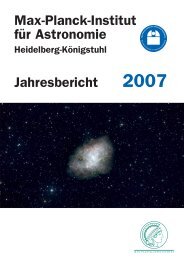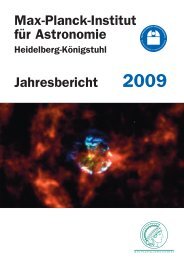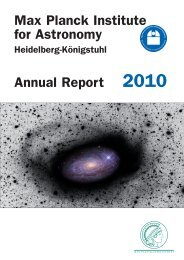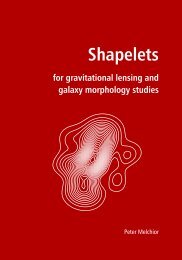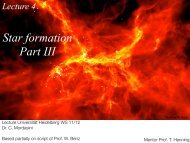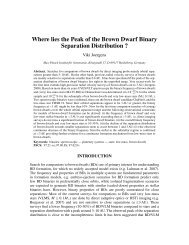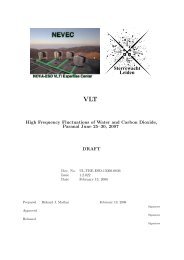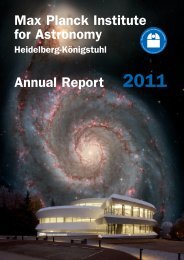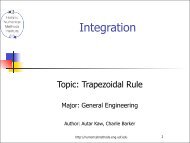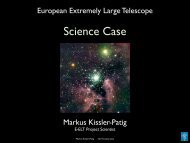Max Planck Institute for Astronomy - Annual Report 2007
Max Planck Institute for Astronomy - Annual Report 2007
Max Planck Institute for Astronomy - Annual Report 2007
You also want an ePaper? Increase the reach of your titles
YUMPU automatically turns print PDFs into web optimized ePapers that Google loves.
142 Further Activities / Compatibility of Science, Work, and Family / Prizes / Cooperation with Industrial Companies<br />
Klaus Jäger contributed to the organization of the public<br />
lecture series “Astronomie in Heidelberg” at the<br />
Planetarium Mannheim.<br />
Martin Kürster served as referee <strong>for</strong> <strong>Astronomy</strong> &<br />
Astrophysics.<br />
Rainer Lenzen was security officer (scientists) and representative<br />
of the disabled persons at MPIA.<br />
Markus Nielbock participated to the “Initiativkreis für<br />
Horizontastronomie im Ruhrgebiet” <strong>for</strong> the promotion<br />
Prizes<br />
Eric Bell received the Heinz Maier Leibnitz Prize of the<br />
German Research Foundation<br />
Henrik Beuther received the Ludwig Biermann Prize of the<br />
Astronomical Society<br />
Fabio Fontanot received the Tacchini Award of the Italian<br />
Astronomical Society <strong>for</strong> PhD Thesis work.<br />
Anders Johansen, Boris Häußler, and Konrad Tristram received<br />
the Ernst Patzer Prize<br />
Nicolas Martin received the Thesis prize from the “Société<br />
des amis des Universités de l'académie de Strasbourg”<br />
Compatibility of Science, Work, and Family<br />
In the course of the last year, more measures were implemented<br />
at the MPIA to improve the compatibility of work<br />
and family. In addition to the existing “baby office” <strong>for</strong><br />
young scientists and researchers, the creation of opportunities<br />
<strong>for</strong> family-related telework, work-at-home, and<br />
the improvement of in<strong>for</strong>mation exchange on the issue<br />
of compatibility of work and family, the MPIAʼs own<br />
daycare room was set up. The MPIA now also shares<br />
entitlement to a total of 20 crib and kindergarten places<br />
with the other <strong>Max</strong>-<strong>Planck</strong> <strong>Institute</strong>s in Heidelberg. The<br />
MPIA also offers a childcare service <strong>for</strong> meetings and<br />
Cooperation with Industrial Companies<br />
4D electronic GmbH, Bretten<br />
AB multimedia GmbH, Oberding<br />
ABB (ehem. Hartmann+Braun),<br />
Alzenau<br />
ADR, Paris<br />
Advanced Office, Bochum<br />
Abacus Deltron GmbH, Unterhaching<br />
Agilent Technologie, Böblingen<br />
Allice Messtechnik GmbH, Frankfurt<br />
allSMT GmbH&Co.KG, Roetgen<br />
Almet-AMB, Mannheim<br />
Alternate, Linden<br />
of astronomical culture (25. – 29.06.); he also helped<br />
in per<strong>for</strong>ming a practical <strong>Astronomy</strong> course at the<br />
Pädagogische Hochschule Zentralschweiz Luzern, and at<br />
the Observatory “Hoher List”.<br />
Jakob Staude, assisted by Axel M. Quetz, edited the 46. annual<br />
volume of the monthly astronomy magazine “Sterne<br />
und Weltraum”.<br />
Sebastian Wolf organized the program “Mini<strong>for</strong>schung” <strong>for</strong><br />
students at MPIA.<br />
<strong>for</strong> one of the best theses defended in one of the universities<br />
of Strasbourg in 2006 (awarded in <strong>2007</strong>)<br />
Benjamin Moster received the Otto Haxel Prize of the<br />
University of Heidelberg<br />
Dominik A. Riechers: PhD Summa cum laude, Awarded a<br />
Hubble Postdoctoral Fellowship at Caltech <strong>for</strong> the research<br />
project: “From the Epoch of Reionization to the<br />
Peak of Galaxy Formation: Properties of Intensely Star-<br />
Forming Galaxies in the Early Universe” (<strong>2007</strong>-2010)<br />
other major scientific events. Together with a number of<br />
other major research facilities and business enterprises<br />
in the region, the MPIA is a member of the Heidelberg<br />
Action Alliance <strong>for</strong> Families. The aim of these networked<br />
research facilities and business enterprises is to increase<br />
the attractiveness of Heidelberg as a city of science and<br />
of business by offering family-friendly organizational<br />
schemes. The measures to improve compatibility of<br />
work and family at the MPIA are permanently upgraded<br />
in order to further improve the boundary conditions <strong>for</strong><br />
research here.<br />
America II Europe GmbH,<br />
Mönchengladbach<br />
Amphenol AIR LB GmbH, Saarlouis<br />
AmpPower GmbH, Bad Homburg v.d.H<br />
Angst+Pfister, Mörfelden<br />
APE Elektronik, Kuppenheim


